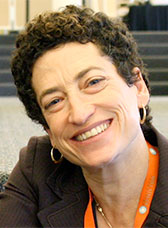From the history of plate tectonics to contemporary climate-change controversies to futuristic fiction, the works of Naomi Oreskes teach both scholarly and popular audiences about how science functions as a social process and how it can be vulnerable to political use and abuse. Through her essays, newspaper and magazine articles, TED talk and other videos, and expert testimony before Congress, Professor Oreskes has also become an important public figure in the climate-change debates. She began her career as a geologist, earning a dual doctoral degree from Stanford University in the fields of Geology and History of Science. After many years at The University of California at San Diego, she is now Professor of the History of Science and Affiliated Professor of Earth and Planetary Sciences at Harvard University.
In her first book, The Rejection of Continental Drift: Theory and Method in American Earth Science (Oxford 1999), Oreskes establishes some of her signature themes. The book is unusual in its attentiveness to the eventual losing side of the debate, and it brings to life a half-century of arguments against moving continents, the ideals of scientific method that undergirded such arguments, and the slow processes of theory change and consensus formation within the community of American geologists.
The theme of consensus-formation is again of central importance in her 2010 book, with co-author Erik Conway, Merchants of Doubt: How a Handful of Scientists Obscured the Truth on Issues from Tobacco to Global Warming (Bloomsbury). The book investigates momentous environmental and public-health questions—concerning not only smoking and global warming, but also acid rain, the ozone hole, and DDT—and explains how the scientific community builds a case and comes to an agreement on such matters, but how smaller groups of political and industry consultants and think-tanks have been able systematically to undermine the scientists’ findings, in the courtroom and in public opinion.
Just this year, Oreskes and Conway came out with a second book, this one a short science-fiction novel, titled The Collapse of Western Civilization: A View from the Future. Set in the year 2393, it depicts the long-term consequences of scientists’ current ineffectuality against the "carbon industrial complex" and our era’s inaction on climate change. Oreskes’ other current projects include Science on a Mission: American Oceanography from the Cold War to Climate Change (Chicago, forthcoming) and Assessing Assessments: A Historical and Philosophical Study of Scientific Assessments for Environmental Policy in the Late 20th Century.
Her book Merchants of Doubt won the Watson-Davis Prize from the History of Science Society in 2011. Among other honors, she has received the Francis Bacon Award in the history of science and technology from the Francis Bacon Foundation and Caltech in 2009 and became a Fellow of the American Association for the Advancement of Science in 2007.


